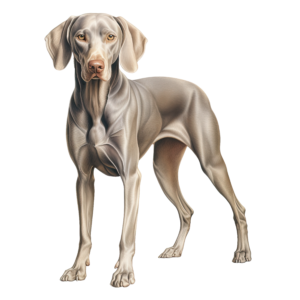Are you considering adding a Weimaraner to your family? Here is everything you need to know about this unique breed to help you make an informed decision.
Weimaraner Traits & Characteristics
The Weimaraner is a medium to large dog known for their elegant appearance and distinctive gray coat. They are intelligent, friendly, and highly energetic dogs that thrive on human interaction and physical activity.
Interactions with Family, Children, and Other Dogs
Weimaraners are affectionate and loyal dogs that form strong bonds with their families. They are known for being excellent with children, displaying patience and playfulness towards them. Weimaraners are generally sociable with other dogs, especially if socialized from a young age.

Physical Characteristics
- Coat Type: Weimaraners have a short, smooth coat that doesn’t shed excessively. Regular grooming can help control shedding.
- Drooling: Weimaraners are not heavy droolers compared to other breeds.
- Fur Coat: The Weimaraner’s coat is soft and silky to the touch, with a sleek appearance.
Social Behavior
- Openness To Strangers: Weimaraners are friendly towards strangers once properly introduced, but they can be reserved at first.
- Playfulness Level: Weimaraners are extremely playful dogs that enjoy interacting with both humans and other animals.
- Watchdog/Protective Nature: Weimaraners make excellent watchdogs due to their alertness and protective instincts.
- Adaptability: Weimaraners are adaptable dogs that can thrive in various living situations as long as they receive enough exercise and mental stimulation.

Personality
- Trainability Level: Weimaraners are intelligent and eager to please, making them relatively easy to train with consistency and positive reinforcement.
- Energy Level: Weimaraners are high-energy dogs that require plenty of exercise to stay happy and healthy.
- Barking Level: Weimaraners are not excessive barkers, but they may bark to alert their owners to potential threats.
- Mental Stimulation Needs: Weimaraners are intelligent dogs that need mental stimulation to prevent boredom and destructive behavior.
Trainability
Weimaraners are considered highly trainable dogs due to their intelligence and eagerness to please. Consistent training with positive reinforcement methods is key to keeping these dogs engaged and focused.
Common Health Issues
Weimaraners are generally healthy dogs, but they are prone to certain health issues that owners should be aware of. Some common health problems in Weimaraners include hip dysplasia, bloat, and hypothyroidism. Regular vet check-ups and a healthy diet can help prevent or manage these conditions.
Facts You Should Know About Weimaraners
- Suitability for Non-Experienced Owners: Weimaraners are best suited for experienced dog owners who can provide them with the mental and physical stimulation they need.
- Difficulty of Training: Weimaraners are intelligent and trainable, but they can be stubborn at times. Consistent training and patience are key.
- Health Issues: Owners should be aware of the potential health issues that Weimaraners are prone to and be prepared to provide proper care and regular vet check-ups.
- Activity Level: Weimaraners are extremely active dogs that require plenty of exercise to prevent boredom and destructive behavior.
- Exercise Needs: Weimaraners should be walked or exercised for at least 1-2 hours every day to meet their energy requirements.
- Destructive Behavior: If left alone for extended periods, Weimaraners may become bored and engage in destructive behavior. Providing mental and physical stimulation can help prevent this.
- Grooming Requirements: Weimaraners have low-maintenance coats that require regular brushing to control shedding and keep their skin healthy.
- Vocalization: Weimaraners are not excessive barkers, but they may bark to alert their owners to potential threats.
- Friendliness towards Strangers: Weimaraners are generally friendly toward new people once properly introduced.
- Compatibility with Other Dogs: Weimaraners can get along well with other dogs, especially if socialized from a young age.
- Space Requirements: Weimaraners need ample space to move around and exercise, so they are not suitable for apartment living.
Nutrition and Feeding
Weimaraners require a balanced diet to meet their energy needs and maintain optimal health. High-quality dog food that is appropriate for their age, size, and activity level is recommended. Owners should be mindful of portion control to prevent obesity, a common issue in the breed.

History and Origins
The Weimaraner breed originated in Germany in the 19th century, where they were bred for hunting large game such as deer and boar. Over time, their hunting skills and amiable nature made them popular as family companions. Weimaraners were first brought to the United States in the 1920s and have since become a beloved breed among dog enthusiasts.
Whether you are considering adding a Weimaraner to your family or simply interested in learning more about this unique breed, understanding their traits, characteristics, and care requirements is essential. By providing proper training, socialization, and care, a Weimaraner can become a loyal and loving companion for years to come.
